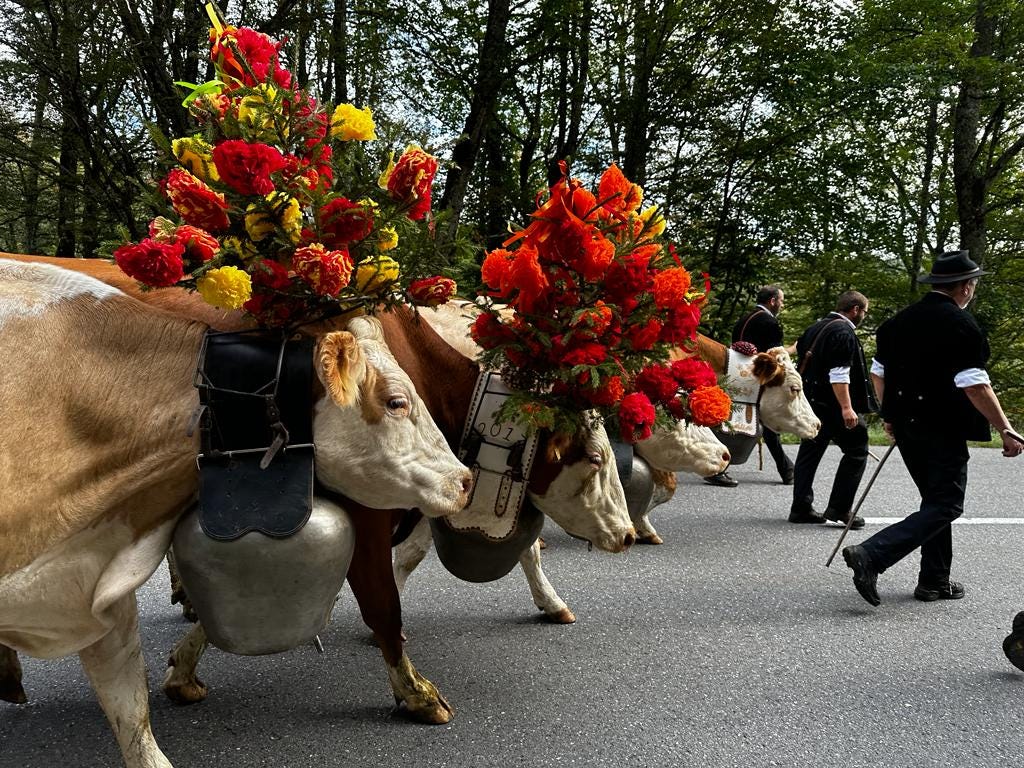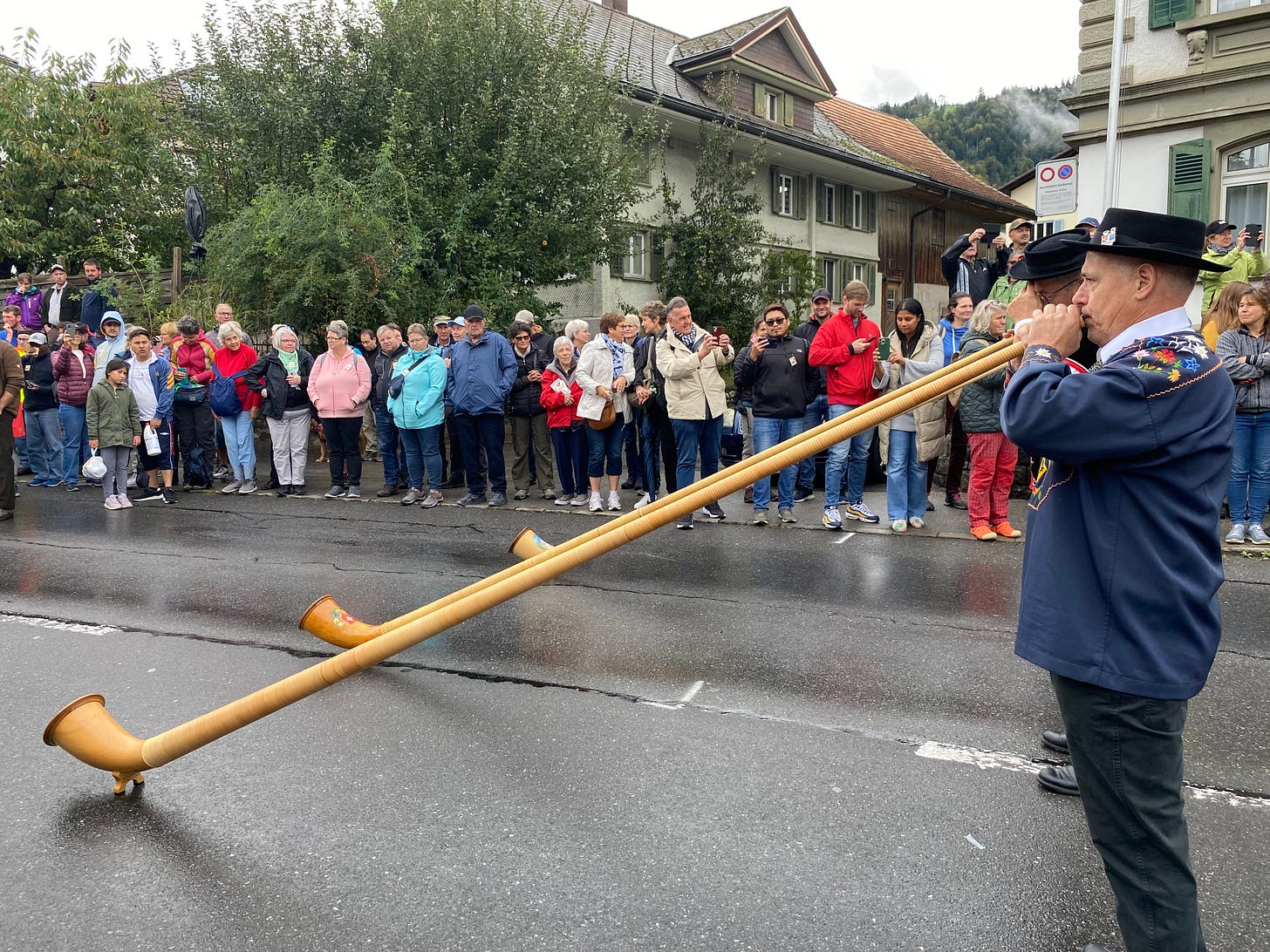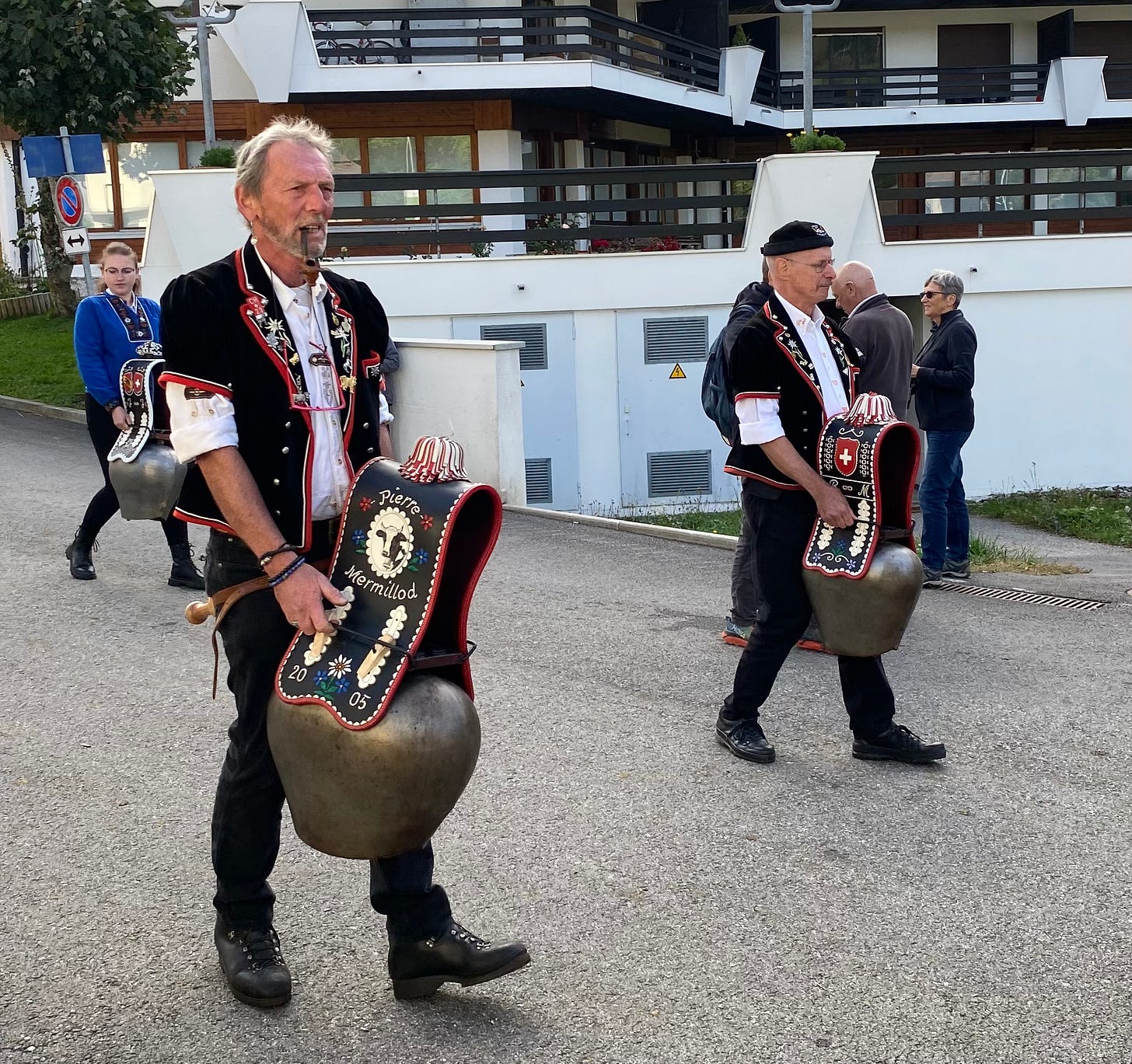What makes a cow beautiful? My friend and neighbor Daniel, who grew up in a tiny mountain village in Canton Graubünden, Switzerland, provides the answer: “Flat back, thin neck, small head, and big udder.” Readers, should you ever be called upon to judge a cow beauty contest, consider yourselves prepared!

Let’s Celebrate Farmers at the Alpabzug!
Every summer, Swiss cows travel1 high up into the mountains to feast on the flowers and grass and to escape the heat and flies. The cows preserve the alpine landscape by cropping the vegetation and by churning the turf with their hooves (not to mention the natural fertilizer). Workers—who are often veterinary students—live in rustic huts among the cows during the summer, move them to different pastures every day, keep them healthy, and make a sharp, tangy cheese called Alpkäse from their milk. (It is not cost-effective to transport the milk down the mountain, so the summer milk is always made into cheese.)
At the end of the summer, the farmers celebrate with an Alpabzug, or cow parade. The most beautiful cow, the strongest cow, and the cow who has given the most milk lead the parade. (Daniel informs me that while the farmers choose the most beautiful and the most productive cow, it is the cows themselves who decide which of them is strongest; they have a clear sense of hierarchy in their herds, apparently.) The farmers deck the cows out with crowns, garlands, and giant bells, and everyone processes with cacophonous hoopla back down to the farms at lower altitudes, along streets lined with cheering crowds.

I have lived in Switzerland for the past five years and have always loved cows, but until a few weeks ago I had never seen an Alpabzug. This year I made up for lost time by visiting cow parades on two successive weekends, one in the German-speaking area, and one in the French. Every year tens of thousands of people attend these celebrations to marvel at the pretty cows, enjoy the yodeling and Alpenhorns, drink beer2 and eat cheese and sausage, and purchase cow-related handcrafts. Below are a few photos I took at the parades.
First, a chorus of Alpenhorns plays a fanfare to inaugurate the festivities:
Teams of Bernese Mountain Dogs pulling little carts lead the parade:
(After the parade, we discovered the dog staging area, where a half-dozen or so floofy beasts were hanging out. Yes, we petted them!)

I especially enjoyed seeing the farmers in their traditional costumes, including these men with their big … bells.
Cow parades are tremendous fun, and they are also a tribute to the importance of agriculture to the Swiss economy. The cheering crowds show how valued farmers are in Swiss culture—it’s only a slight exaggeration to say that the farmers were greeted like Super Bowl champions.
The Swiss Handshake
My car, Frau Rüdisühli,3 celebrated her fifth birthday this year, and so she underwent a Swiss rite of passage in the form of a car inspection. I received a letter informing me when and where to report for the inspection, and when Frau Rüdisühli and I trundled up to the inspection center, we were greeted by a young woman sporting a lavender crew cut. She looked me in the eye, shook my hand, and explained the inspection procedure in perfect English. During the inspection, I noticed that she had to run up and down a flight of stairs repeatedly to get to and from the inspection pit, and we joked about how her job was better than a gym membership. She took obvious pride in the impeccably spotless inspection center (truly, you could have eaten off those floors), and she also taught me a number of abstruse German words for car parts (which I promptly forgot). At the end of the inspection, she stamped Frau Rüdisühli’s papers and then looked me in the eye and shook my hand as we said goodbye.
What could this pleasant little story possibly have to do with the Alpabzug? Well, in both cases I was struck by the respect Swiss people have for workers, and by the pride workers from all walks of life take in their jobs. The car inspector who shook my hand was not an anomaly: When workers here do their jobs well, it is common for us to shake hands with them, to honor their professionalism and to thank them for their work.
A Workers’ Paradise in Switzerland?
A writer I greatly admire, Fredrik deBoer, argues in The Cult of Smart that people vary naturally in intelligence—just as we do in our athletic, musical, and artistic abilities—and that the evidence shows that our intellectual aptitude is mostly immutable. Unfortunately, the way American society is set up, economic rewards go almost exclusively to people with academic talent. The result is that we push all children onto a single, difficult, expensive path—a university degree—when many young people would be better off pursuing nonacademic careers. Even worse, many jobs in the US require applicants to hold a bachelor’s degree, when the actual work at those jobs could easily be performed by someone with a high-school diploma. Freddie4 believes, and I agree with him, that all people ought to enjoy lives free of economic worry, regardless of the work they do.
No country is perfect, but nearly everyone living in Switzerland does indeed live free from economic anxiety. While Switzerland has no nationwide minimum wage, several cantons have instituted minimum wages, which range from about $20 to $25 per hour, and wages across the country, even in cantons without a minimum wage, are extremely high compared with other countries. In addition, Switzerland, like all European countries and unlike the US, has universal healthcare and a robust social safety net. As a result, the Swiss poverty rate is less than half that of the US (5.2 percent compared with 11.5 percent).5
Last week on his Substack, Freddie wrote, “I think a really trenchant question for the kids who forego college is this: what will you do instead? How will you spend those four-plus years of your life, if not in school?” He goes on to lament the loss of funding for public colleges: “A humane society would ask why it’s allowed the burden of paying for college to be shifted to its young people, at the same time that its educational ideology machine has made college attendance a kind of secular sacrament.” Freddie makes an excellent point; we have made college prohibitively expensive, and we really don’t have options in the US for kids who decide against college, beyond joining the military or taking a low-paying job.
But there is another way. It is common for young people in many European countries, Switzerland among them, to choose apprenticeships instead of college. These programs offer some classroom instruction, but most of the learning comes through practical experience and through being mentored by senior workers. Apprenticeships are available for jobs in the trades and service, but also in fields such as health care, financial advising, and office work. Apprenticeships are cost-effective—in fact the apprentices, far from having to go into debt, earn wages. Apprenticeships provide better training too, because most of us learn best not by sitting in a classroom and listening to lectures, but by receiving expert guidance and then trying things out ourselves, learning from our mistakes, and accumulating real-world experience. Apprenticeships also bind the generations together by making senior workers invested in and responsible for the development of younger workers.
I recognize that we are a long way from a workers’ paradise in the US. For now, we ought to speak up for a living wage, a social safety net, and apprenticeship programs, and maybe one day we will even be able to vote these humane policies into law. We can support political leaders like Pennsylvania Governor Josh Shapiro who have eliminated college degree requirements for most government jobs. And we can act to change our culture’s attitude toward regular workers and nonacademic jobs. Yes, it will be a challenge. It means that if our kids want a different path than four-year college right after high school, we would not panic but would hear them out and make a plan. It means that single people would stop swiping left on potential dates who work blue- or pink-collar jobs but would give them a chance instead. It means that we would extend compassion to slower service workers and express gratitude to the efficient ones. And who knows? Maybe one day a handshake to commemorate a job well done will be the custom in the US too. Maybe one day we will see our workers parading through cheering crowds, just like at the Alpabzug. We can dream!
How about you, readers? In an ideal world, what changes would you make to help working people? Please share your thoughts in the comments!
The Tidbit
Yes, Switzerland is a truly marvelous place, full of cheerfully competent workers. But should life ever go awry, readers will be glad to hear that there is a rich vocabulary of German insults available, many of which I recently read about in a magazine for German learners, Deutsch Perfekt. These wonderfully colorful insults range from the mildly rude to the truly obscene. Below are ten of my favorites, with a literal translation of the original German. Enjoy—and use with caution!
A skinny young man is ein Spargeltarzan, or an asparagus Tarzan.
An irritating guy is ein Saftsack, or a juice bag. (Maybe people were expecting beer and were disappointed?)
A person who talks too much is ein Dampfplauderer, or a vapor chatter.
There are several ways to insult a man by saying he is weak. He might be a Weichei (soft egg), a Warmduscher (someone who showers in warm water), a Sitzpinkler (someone who sits to pee), or a Muttersöhnchen (little mother’s son).
A naughty child is ein Satansbraten, or Satan’s roast beef.
An incompetent driver is ein Kreisverkehr-Zwei-Mal-Fahrer, or a person who drives around the traffic circle twice. (As someone who gets more irritated than I ought at confused and poky drivers, I may find myself using this one!)
Finally, while all of the above insults are comparatively mild, there is one that the magazine warns is vicious and vulgar and should be used only against the rudest, grumpiest, most horrible people: Stinkstiefel. Brace yourself for the literal translation: It’s stinky-boots! Tee hee!
The cows usually walk up under their own power—this is called an Alpaufzug. My husband and I were lucky enough to happen upon an Alpaufzug by chance this last spring. But cows can also be trucked up. One spring on a hike high up in the mountains I saw trucks with empty animal trailers, whose drivers were practicing navigating the tight switchbacks up the steep slopes. Those truck drivers had impressive skills!
I among them, of course. At one stand, beer was available in 3dl and 5dl sizes, and I held up three fingers to indicate that I wanted a 3dl beer. The beer wallah thought I meant three beers, and I only managed to stop him when he was halfway through pouring a second beer. No worries! He just grinned and drank it down. Problem solved!
So named for a character in one of my German textbooks.
For some reason, absolutely everyone online calls him Freddie instead of deBoer. I like the friendly vibe, so I’m adopting the practice and calling him Freddie too.
In fact the difference is likely far starker, because the two countries measure poverty differently. The Swiss poverty figure is based on the “material deprivation rate,” in which people “have to forego important goods, services and social activities for financial reasons,” while the US sets the poverty line significantly below this level. At an annual income of $13,590 for an individual or $20,030 for a family of three, people are hard-pressed even to feed and house themselves, let alone spend money on social activities. In addition, if we take the universal healthcare and worker protections in Switzerland into account, the Swiss system looks still better.







I mean, if I had known "study veterinary medicine while living in an Alpine hut making cheese and gazing out at the cows" was an option, I wouldn't be a lawyer now!
What a wonderful custom! I'd love to be able to see it, I've always had a soft spot for cows. Having grown up in a rural area, they were very common. The thing that always catches me about them is how curious they are!
About the idea of the college/not dilemma in the US, it is absolutely a shame that it's come to what it is. Another organization, though small, that's speaking up about it is the Mike Rowe Works Foundation headed by the mildly famous TV show host of the same name. I've really liked to see what he's doing in helping people learn and find good jobs without college.
Thanks for your work!